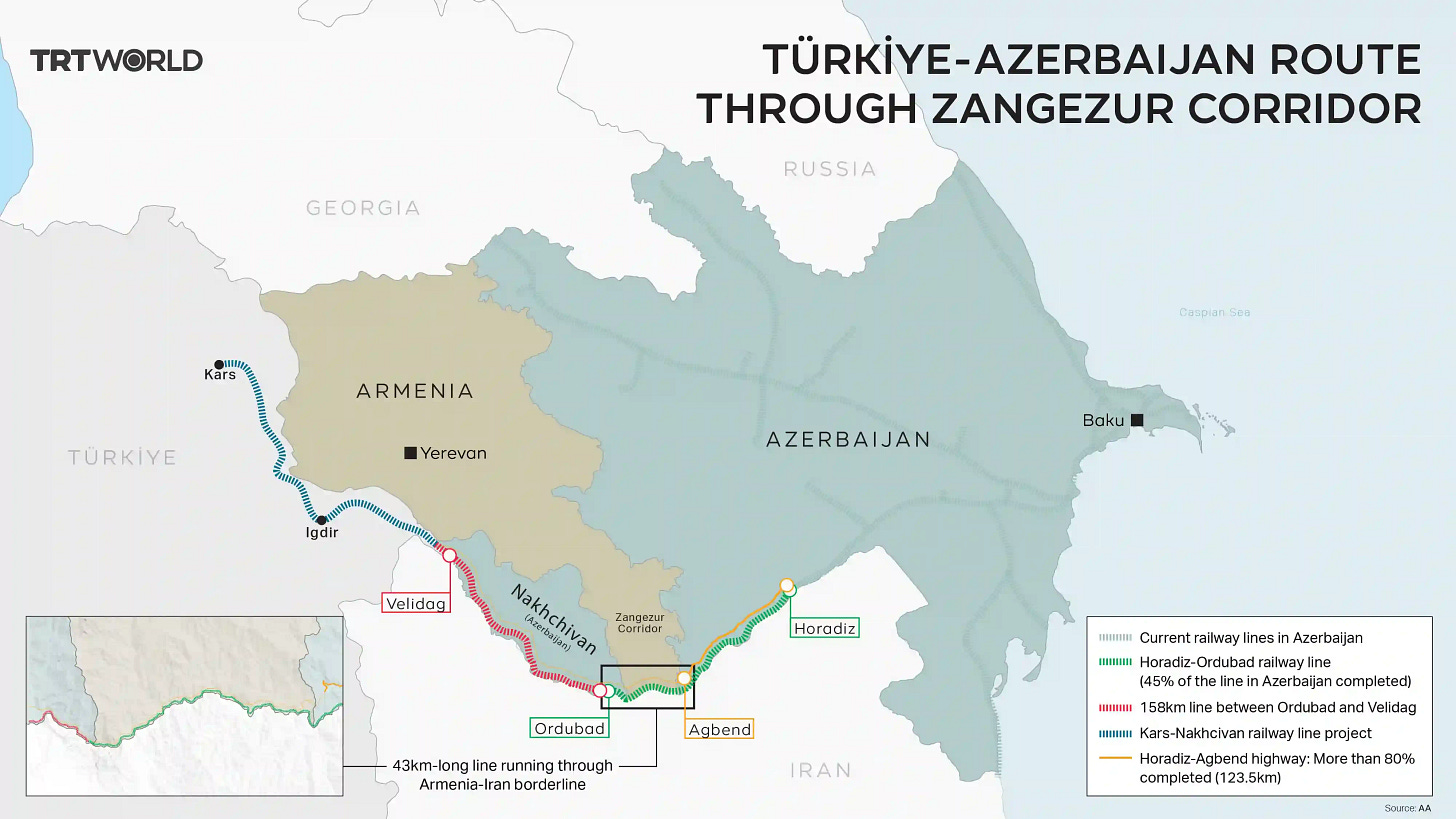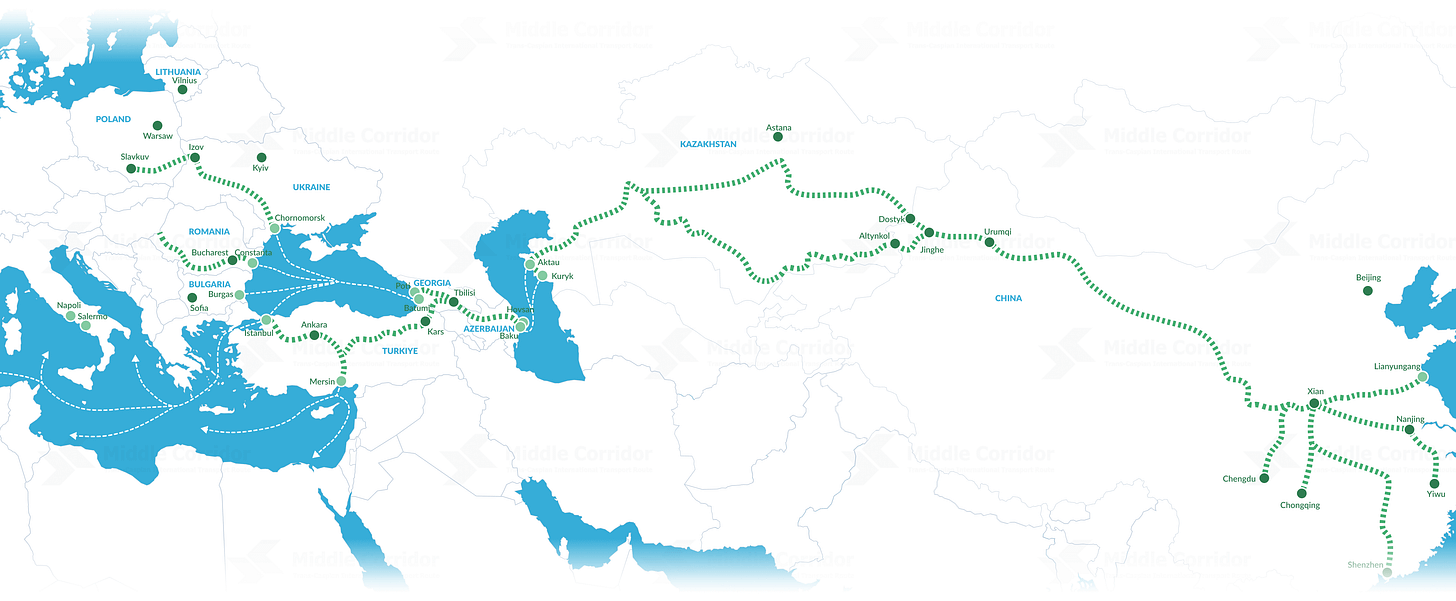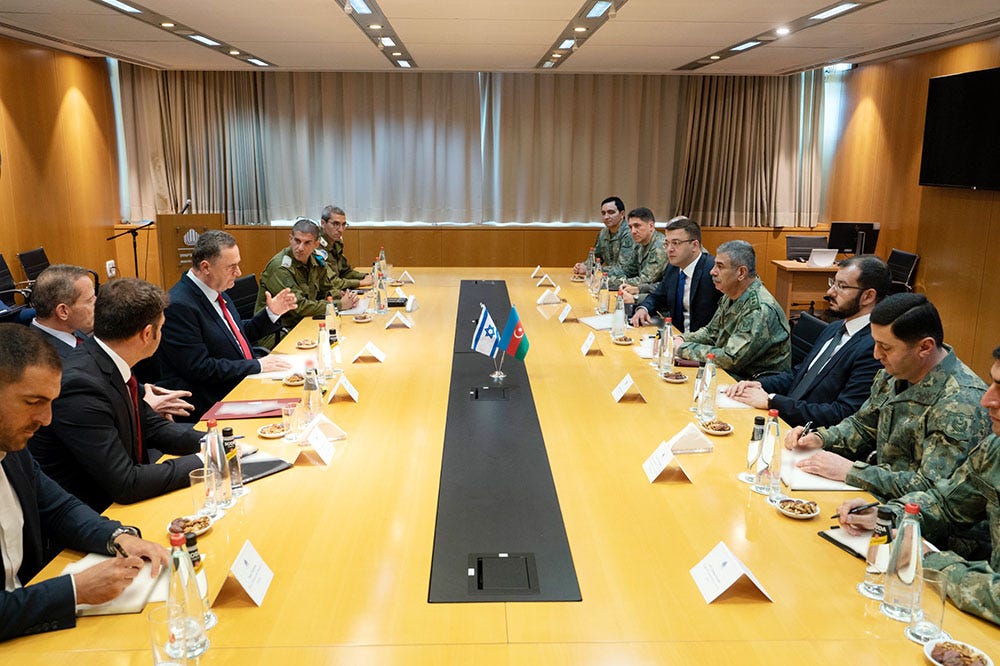Understanding Russian and Iranian Fears Over Armenia-Azerbaijan Peace Deal and Middle Corridor Trade Route - an Interview with Jennifer Wistrand
South Caucasus expert Jennifer Wistrand joins OPFOR Journal to discuss the global consequences of the recent U.S. brokered peace deal between Armenia and Azerbaijan.
The South Caucasus region, between Turkey, Russia, and Iran, is a little considered but increasingly consequential arena for great power competition. The past year has seen immense change in the geopolitical landscape of the region. The once pro-Western government of Georgia has shifted decisively toward the Russian sphere of influence, while both Armenia and Azerbaijan have shifted toward the West. The latter shift was most apparent when Armenia’s Prime Minister Nikol Pashinyan joined Azerbaijan’s President Ilham Aliyev at the White House on August 7, 2025 for the signing of a historic joint declaration committing both countries to a long-term framework for peace and regional cooperation. The U.S.-brokered agreement is likely to be one of the most significant developments in the recent history of the South Caucasus and has triggered alarm in both Moscow and Tehran.
This week one of the foremost U.S. experts on the South Caucasus, Jennifer Wistrand, joins OPFOR Journal to discuss the rapidly shifting regional dynamics.
Jennifer Wistrand is the former Deputy Director of the Kennan Institute and an adjunct professor at Georgetown University. She holds a BA in Anthropology and French from Northwestern University and an MA and PhD in Anthropology from Washington University in St. Louis. Her areas of expertise are migration and forced displacement in the Caucasus and Central Asia and humanitarian and development approaches to managing migration and forced displacement.
On The Global Implications of Peace and Cooperation Between Azerbaijan and Armenia
Dan White
Hi Jennifer! In June you testified before the Commission for Security and Cooperation in Europe that a normalization of relations with Turkey would help Armenia feel less dependent on Russia for security guarantees. Does the current peace framework between Armenia and Azerbaijan represent a loosening of Russian influence on Armenia? If so, what does that mean for Russia’s current military base in the country?
Jennifer Wistrand
Hi Dan, that is a great question. If you step back and look at the relationship between Armenia and Russia over the past few years, you see an unraveling. A concrete example of this unraveling would be the Collective Security Treaty Organization (CSTO), which Russia initiated, and which includes Russia, Belarus, Armenia, Kazakhstan, Kyrgyzstan, and Tajikistan. The six countries are supposed to be bound by a similar security pact as NATO, where an attack against one is supposed to necessitate a response by all. However, Russia did not uphold its obligations to come to the defense of Armenia in 2023. This led Armenia to start to rethink its relationship with Russia, and it ultimately led the government of Armenia to say that it was going to withdraw from the CSTO and look for security guarantees elsewhere. This resulted in Yerevan looking to the European Union for security cooperation, and to India for weapons.
I cannot speak to the status of the base that Russia has in Armenia, because closing a base is much more complex than withdrawing from a treaty.
On Iran’s and Russia’s Concerns Over the Middle Corridor
Dan White
A core component of the new peace framework is the realization of a trade corridor connecting Azerbaijan to Turkey through Armenia. Iran has voiced strong opposition to this route, often called the Zangezur or Middle Corridor. What is the strategic significance of this trade corridor and why does Iran see it as a security threat?
Jennifer Wistrand
The Zangezur or Middle Corridor would connect Azerbaijan with its detached province of Nakhchivan by way of Armenia’s Syunik province. This would be a very significant development because it would open up a new trade route between the EU and China.


The EU is China’s biggest trading partner, and China is the EU’s second biggest trading partner after the U.S. An overland trade route through the South Caucasus would enable cargo to pass from the EU to China by way of Turkey, the South Caucasus, and Central Asia. By extension, the trade corridor would bring tax revenue to the countries it passes through.
The Middle Corridor would disadvantage both Russia and Iran by providing a land-based trade route that bypasses both countries. Russia and Iran have discussed developing their own trade corridor that runs north to south. As of right now, the Middle Corridor cuts out both of them.
Iran has a complicated relationship with Azerbaijan which stands to gain a great deal from the Middle Corridor. About a quarter of Iran's population is ethnically Azerbaijani. This population lives primarily in the northwestern part of Iran near the border with Azerbaijan. Azerbaijan refers to this area as Southern Azerbaijan, even though the border between what we now know as Azerbaijan and Iran has not changed in nearly two centuries.
The Middle Corridor also represents a loosening of Iran’s influence over Armenia. Armenia and Iran have long had close relations. Iran is known to have supported Armenia security-wise during the various conflicts it had with Azerbaijan. With the new U.S.-brokered peace deal, Armenia is signaling, “I do not want to rely on Russia. I do not want to rely on Iran. I would rather rely on the U.S., EU, India, and others.”
Iran and the U.S. have not had good relations since the late 1970s. So that is another reason why any deal with strong U.S. backing is going to be a potential threat to Tehran.
Dan White
Russia has also expressed concern about the Zangezur Corridor. What are the Kremlin’s concerns?
Jennifer Wistrand
The agreement that was brokered in Washington gives the U.S. exclusive rights to economically develop the Middle Corridor, which effectively shuts Russia out from an area that it deems to be its sphere of influence, because of its history as a part of the Soviet Union.
At the same time, since the conflict between Azerbaijan and Armenia started in the early 1990s, Russia has been one of the conflict’s peace brokers. Following the 1992-1994 war between Azerbaijan and Armenia, the international order established the Minsk Group, which was co-chaired by the United States, France, and Russia. For more than 20 years, the Minsk Group attempted to broker a peace agreement between Azerbaijan and Armenia, but it was unsuccessful. In 2020, it was Russia, and Russia alone, that brokered a ceasefire agreement between Azerbaijan and Armenia, and between 2020 and 2023, it was Russian peacekeeping troops who maintained the peace. That arrangement fell apart in 2023, when Azerbaijan successfully launched a one-day offensive to regain control of Nagorno-Karabakh. This led Armenia to distance itself from Russia and look for partners elsewhere.
For the past 25 to 30 years, Russia has had its finger on the pulse of each of the three South Caucasus countries in one way or another. It occupies 20 percent of Georgia's territory, and it has “mediated” the conflict between Azerbaijan and Armenia over Nagorno-Karabakh.
On Deteriorating Relations Between Azerbaijan and Russia
Dan White
Relations between Russia and Azerbaijan have also rapidly deteriorated in recent months. The blow up between the two countries seems to have begun in the wake of the downing of Azerbaijan Airlines flight 8243 by Russian air defenses on December 25, 2024. The feud between Moscow and Baku has intensified since and encompassed a litany of new grievances, suggesting a much broader rift in the relationship. What explains this dramatic transformation in their relationship? And how does this conflict fit into the broader pattern of declining Russian influence in the South Caucasus?
Jennifer Wistrand
Looking at Russia's relationship with Azerbaijan, it is right to say that it took a turn after the downing of the plane. But the bigger issue is why Azerbaijan has been able to push back against Russia so assertively.
Azerbaijan’s more independent and assertive foreign policy did not happen overnight. Azerbaijan has steadily gained advantage by growing its economy and developing partnerships with other powers. Since 2006, Azerbaijan has been transporting its oil and natural gas from the Caspian Sea through Georgia to Turkey and then into Europe and elsewhere. This has made Azerbaijan economically self-sufficient and enabled it to chart its own course.
Ten to 20 years ago, Azerbaijan would have had to have been more cautious with respect to Russia, but now it has a presence on the international stage. It hosted the COP29 last fall. It was the first of the 15 former Soviet republics to host an event of that standing. Then, look at the other relations Azerbaijan has cultivated in recent years, beyond its closest ally Turkey.
It has grown closer with Pakistan. It has strong ties with the Central Asian states and has been included in regional projects with them. It works with China. Azerbaijan also maintains close security relations with Israel.
Azerbaijan has developed a group of regional partners that it can turn to for support against Russia. Azerbaijan is in a much more secure place than either Georgia or Armenia, and Russia cannot pressure it in the same way that it can the two other countries.
On Tensions Between Azerbaijan and Iran
Dan White
Relations between Azerbaijan and Iran have also become rocky. Iranian officials have openly accused Baku of assisting the U.S. and Israel during the recent “12 Day War”. What is the source of tension between the two countries?
Jennifer Wistrand
I earlier discussed the tensions between Azerbaijan and Iran stemming from the ethnic Azerbaijani population in northwestern Iran, as well as Iran’s support for Armenia during the decades-long conflict between Azerbaijan and Armenia over Nagorno-Karabakh.
Additionally, Azerbaijan and Israel have developed a close relationship over the past decade. You will hear different reasons from different people as to the genesis of this relationship, but what it has resulted in—irrespective of the origins—is Azerbaijan diversifying the sources of its weapons and its intelligence. Azerbaijan made a conscious decision a decade year ago to start pursuing this diversification. Part of what has enabled this diversification is its ability to export its oil and natural gas. Azerbaijan’s economic independence has given it the ability to buy advanced weapons not just from Turkey but from Israel too. The growing diplomatic and security relationship between Azerbaijan and Israel is seen as a threat by Iran.

Dan White
All right, Jennifer, thank you very much for your time. This has been a really informative interview.
Jennifer Wistrand
Thank you very much for the invitation, Dan. I am very appreciative.
FOR MORE FROM JENNIFER WISTRAND
Check out her June 25, 2025 testimony to Congress’s Commission on Security and Cooperation in Europe on the significance of an enduring peace between Armenia and Azerbaijan.
Also, please watch Jennifer’s recent TV appearance on CSPAN on August 15, 2025 discussing the summit between President Trump and President Putin in Alaska.




